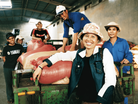Coffee Brings Nestlé ‘Largest Organic Growth’

Nestlé's coffee brands, Nescafé, Nespresso and Starbucks have enjoyed strong organic growth, the company’s H1 2024 results show. However overall sales growth for the consumer goods giant were below market expectations.
Three years of inflation, coupled with a global cost of living crisis, has seen large numbers of consumers trade down to cheaper products.
"There is value-seeking behaviour among consumers,” Nestlé CEO Mark Schneider confirmed on a call with journalists, Reuters reports. “There is pressure, especially at the low-income range," he added.
Nestlé, the world's biggest packaged food company, also trimmed its projections for organic sales by 1%, to 3%. Schneider says the company had to slow the pace of price increases earlier than it wanted “because consumers became increasingly cost-conscious”.
Nestlé is stepping up investment in its brands, Reuters points out. This approach differs to that of Unilever, which is seeking to “do fewer things, better", by focusing on its most popular lines.
Despite its trimmed expectations on organic growth, Nestlé coffee brands performed well. Coffee was its largest organic growth contributor with “mid single-digit growth”.
The company is strongly invested in coffee, on an ESG level as well as a commercial one.
Nestlé’s ‘Cocoa-farming families’ see ‘higher yields and incomes’
Nestlé's Income Accelerator programme, launched two years ago, is also making significant strides in addressing challenges faced by cocoa-farming families.
The programme aims to improve cocoa-farming families' livelihoods by increasing yields, diversifying income, promoting education and empowering women. It rewards good practices, targets child labour reduction, and seeks to close the living income gap for cocoa farmers in West Africa.
According to a KIT Institute report (an independent assessment of Nestlé's income accelerator programme), participating farmers have seen a 32% increase in cocoa yields and a 38% rise in household income.
The programme, which aims to close the living income gap and reduce child labour risks, has expanded to include 30,000 families in Côte d'Ivoire and Ghana.
Nestlé has partnered with Cargill and Rainforest Alliance to ensure traceability and sustainability in its cocoa supply chain.
The company has also introduced KitKat bars made with cocoa from participating farmers.
By 2030, Nestlé aims to reach 160,000 cocoa-farming families through this initiative.
Growth across Nestle’s products in the first half of 2024
Here are some other highlights from Nestlé’s results.
PetCare: Mid-single-digit growth, propelled by the continued popularity of science-based premium brands, notably Purina Pro Plan, Fancy Feast and Purina ONE.
Confectionery: Sales surged at a high single-digit rate, spearheaded by KitKat and key local brands.
Water sales: demonstrated mid-single-digit growth, bolstered by S.Pellegrino's sustained momentum and Perrier's resurgence.
Infant nutrition: recorded low single-digit growth, driven by ongoing demand for NAN Lactogen, (Nestlé's premium infant formula brand, designed to provide essential nutrients for babies' growth and development) and human milk oligosaccharides (HMOs) products.
Nestlé Health Science: achieved positive growth with sales improvements across most segments in the second quarter. The integration plan remains firmly on track.
Nestlé Health Science is a global nutrition company that develops and provides medical nutrition products, meal replacements, and supplements to support healthier lives through science-based nutritional solutions.
Dairy: sales remained nearly flat, as robust growth in dairy culinary solutions counterbalanced declines in coffee creamers and ambient dairy.
Culinary: Maggi (the fortified bouillons and noodles that help address micronutrient deficiencies in child nutrition) delivered strong growth, which was offset by a downturn in frozen food sales in North America.
Schneider added: “Real internal growth is back. We delivered improved volume and mix growth.
“Nestlé Health Science is recovering as planned and is set for a strong second half. Looking ahead to the remainder of the year, we will continue to drive RIG by launching innovations that address consumer trends and growing our large iconic brands”
--------------
Make sure you check out the latest news at Food Digital, a BizClik brand.
Featured Articles
Fresh investment supports TRACT in enhancing tools for sustainability in the food and agricultural sectors, aligning with EU regulations
The devastating floods in Spain have shaken up the global citrus supply, heightening challenges in the fruit juice drinks market
McDonald's has spent 40 years supporting students with scholarships & plans to continue, despite Robert F. Kennedy Jr.’s plan to Make America Healthy Again




